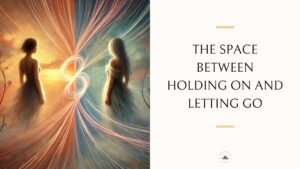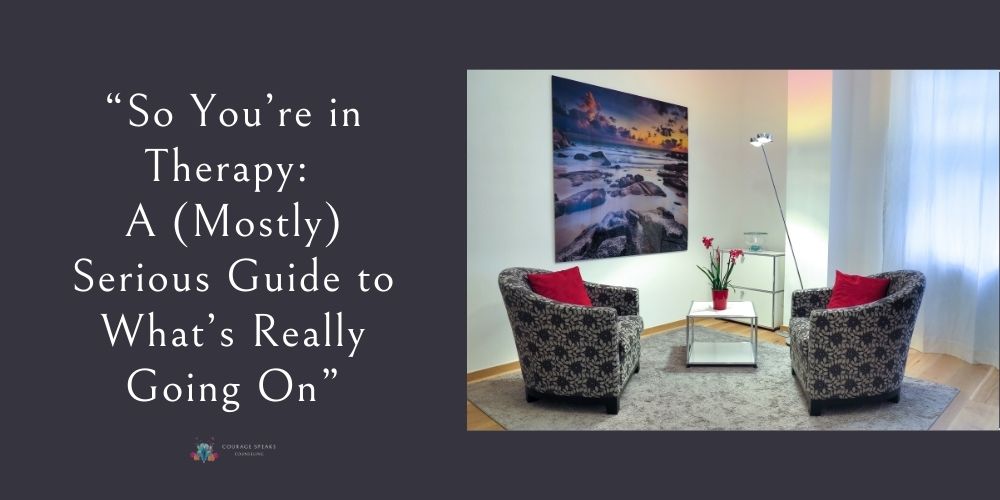Therapy. The word alone conjures up images of couches, tissues, and that awkward moment when your therapist says, “What do you think that means?” But beneath the clichés lies a transformative, sometimes hilarious, and deeply human experience.
If you’ve ever wondered what’s really happening in therapy—or if you’re considering it but unsure what to expect—let’s break it down. Therapy is like untangling a giant ball of holiday lights: it’s frustrating at first, full of twists and knots, but eventually, you start to see the shape of something beautiful.
And yes, sometimes the process of getting there is awkward and messy—but it’s also the greatest investment you’ll ever make in yourself.
The Real Truth About Therapy
First things first: therapy is not about “fixing” you because you’re not broken. It’s about discovering how your experiences, beliefs, and emotions have formed the (often invisible) blueprint for how you navigate life. Think of therapy as a journey to find that hidden instruction manual you didn’t know existed—and maybe rewriting a few chapters.
Your Inner Cast of Characters
Let’s talk about you. Actually, let’s talk about all the yous—the inner critic who tells you to keep it together, the dreamer who believes everything is possible, and the part of you that just wants to binge-watch a show instead of doing the work. Therapy isn’t just about your story; it’s about all these inner voices and how they shape your life.
In therapy, these parts don’t get labeled as “good” or “bad.” They’re all you, and they all have a reason for showing up. The part of you that lashes out in anger? It’s probably trying to protect you from hurt. The part that shuts down and avoids conflict? It might just want to keep you safe.
The trick isn’t silencing these voices—it’s understanding them. Your therapist is basically the translator, helping you figure out why these parts are saying what they’re saying, so you can decide which ones to listen to and when.
Therapy Is Basically Detective Work
Imagine your therapist as a kind, nonjudgmental detective piecing together the puzzle of your life. They’re not there to solve it for you, but to hand you the magnifying glass and say, “Let’s look at this together.”
• That pattern where you always put everyone else first? Maybe it started because you had to as a kid.
• That fear of speaking up in relationships? It might have something to do with a moment when your needs were dismissed long ago.
• That tendency to avoid vulnerability like it’s a bad ex? Yeah, we’re going to talk about that too.
Therapy helps you see how your past experiences are still running the show, even when you don’t realize it. Once you notice these patterns, you can start to shift them—not because you should, but because you want to.
The Humor in Healing
Here’s the thing no one tells you about therapy: it’s funny. Not in a sitcom way, but in a “life is absurd, and we’re all just figuring it out” way.
• Like when you realize the coping mechanism you thought was your genius survival strategy is actually the reason you’re stuck.
• Or when your therapist points out a pattern you’ve been repeating for years, and you’re like, “Oh no, not that again.”
• Or the moment you catch yourself saying, “I’m angry,” and immediately follow it with, “But not in an angry way,” because emotions still make you squirm.
Healing doesn’t mean taking yourself so seriously that you forget to laugh. In fact, laughter is often the best sign that you’re getting somewhere.
What You’re Really Paying For
At its core, therapy is about creating a relationship where you can be fully seen, heard, and understood. This might sound simple, but when was the last time someone truly listened to you without interrupting, fixing, or one-upping your story?
Your therapist isn’t just there to listen, though—they’re there to help you listen to yourself. To notice the thoughts, feelings, and beliefs you’ve been ignoring. To teach you that your emotions aren’t scary monsters under the bed but messages from parts of you that need attention.
And yes, sometimes you’re paying for a professional witness to the emotional rollercoaster that is your life. But that’s worth it because there’s nothing more healing than knowing you don’t have to navigate it alone.
Therapy Is Weirdly Hopeful
Here’s the paradox of therapy: the deeper you go into your pain, the more hope you find. When you stop running from the parts of yourself you don’t like, you discover they’re not as terrifying as you thought. When you finally sit with the grief, anger, or fear you’ve been avoiding, you realize it’s not endless—it’s just a wave that passes when you let it.
And as you reconnect with yourself, something amazing happens: your relationships change, your choices shift, and you begin to live a life that feels more like you.
So, Is Therapy Worth It?
Absolutely. It’s not always easy. Sometimes it’s uncomfortable, messy, and downright awkward. But it’s also life-changing, freeing, and surprisingly fun.
So if you’re in therapy—or thinking about starting—know this: you’re not just learning how to heal; you’re learning how to live with your whole self, one tangled light strand at a time. And when those lights start to shine? Well, it’s nothing short of magic.
Embracing Shadows, Illuminating Hope,
Chelsey Fjeldheim, LCSW
Empowering Souls on the Path of Healing
Copyright © 2025 Chelsey Fjeldheim, Courage Speaks Counseling




